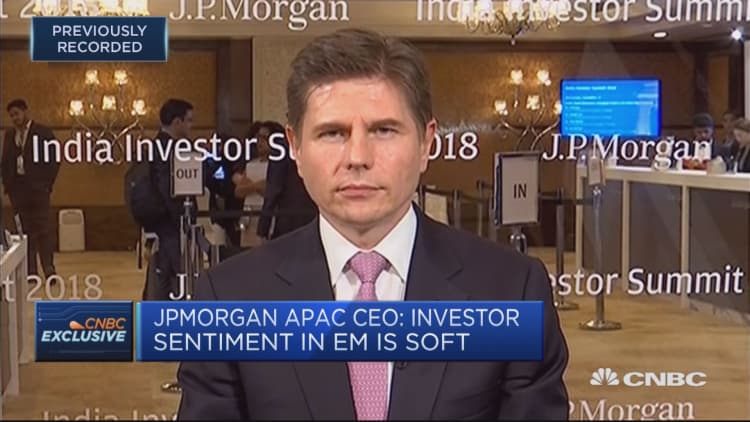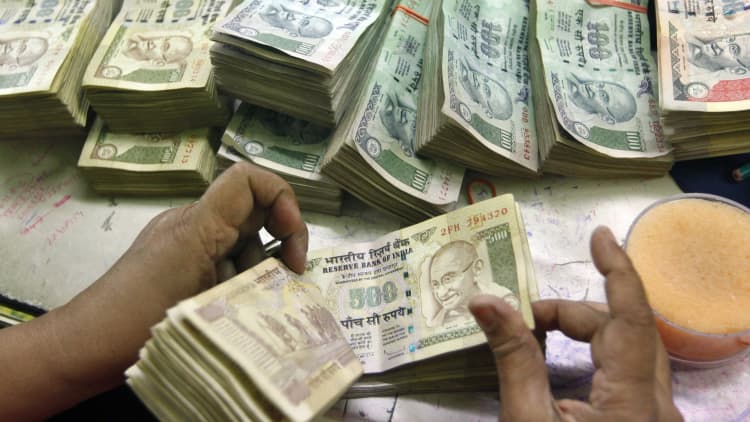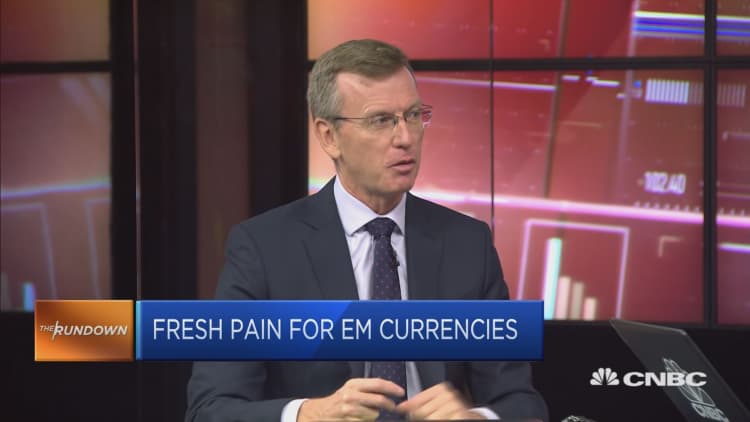
Jamie Dimon isn't worried about emerging markets — and thinks they shouldn't even be called emerging markets, he told CNBC-TV18's Shereen Bhan in New Delhi on Thursday.
"I'm not really concerned about emerging markets — put Turkey and Argentina aside where I think you have very serious issues — the rest of the emerging markets are actually doing quite well," the J.P. Morgan CEO said during the bank's third annual India Investment Summit.
Emerging markets became submerging markets by last spring, with currencies falling across the board and the blame falling squarely on rising interest rates and a stronger dollar. Added stress has come from the steady uptick in trade tariffs between the U.S. and its trade partners, particularly China.
But global growth remains healthy overall, and strong fundamentals in major emerging economies suggest that jitters may be more a result of short-term volatility rather than long-term growth threats.
"America's gotten stronger, the dollar has gotten stronger, but that's actually good for the world. The world is actually growing quite healthily," Dimon said. "The emerging markets are more like a teething thing. They're not all the same, I don't even think they should be called emerging markets anymore, to tell you the truth."

Pro-growth agendas in many developing economies, solid corporate earnings and well-performing large public companies play a major role in what analysts view as attractive fundamentals in some of these markets. China, Indonesia, Malaysia, Singapore, South Korea and Thailand have enjoyed annual average growth of at least 3.5 percent between 1966 and 2016, according to the McKinsey Global Institute, and all recovered well from the 1997 Asian financial crisis.
But the immediate-term picture is clearly less rosy: emerging market gross domestic product (GDP) growth fell to 4.1 percent in August from 4.3 percent in July, the lowest since April 2016, according to estimates from the Institute of International Finance. And the MSCI emerging markets index has fallen more than 11 percent year-to-date.
Rising rates have meant that emerging economies holding heavy dollar-denominated debt will need to shell out more to pay those debts off.
The hit a record low this week at 72.84 to the U.S. dollar, with Indonesia and Thailand's currencies also taking a hit along with the rest of Asia, in part due to the impact of America's burgeoning trade war with China. Turkey's lira had lost 40 percent of its value against the dollar by August over Ankara's reluctance to raise interest rates in an overheating economy and a diplomatic row with the U.S., sending shockwaves across emerging markets. Meanwhile, major Latin American markets Argentina and Brazil are facing turmoil of their own.
Optimistic about India
Investors should shrug off India's currency fluctuations, Dimon added, praising the country of 1.3 billion for its economic reforms.
"When I come to India, very often I see the people are a little depressed about something," he said, acknowledging the higher cost of goods brought on by the rupee's fall. "You're growing at 8 percent." India's growth rate reached 8.2 percent in August, its highest level in more than two years.
That impressive growth rate is thanks to "tremendous progress" made by India's government, Dimon said, adding that full credit should go to its Prime Minister Narendra Modi, who entered office on the promise of making "unlimited" economic reforms and revamping India's image as a place to do business.
"With the GST (Goods and Services Tax) infrastructure, benefits transfers — all the things that are making the economy grow better — and, of course, you have a very vibrant entrepreneurial sector, corporate sector etc., we're quite optimistic about the long-term growth of India and pay a lot less attention to what's happening with the rupee today."

Modi launched his "Make In India" campaign to lure foreign manufacturers to the country in 2014, and has since worked to liberalize investment laws in a number of sectors and reduce red tape. India is now in recovery mode after a slowdown in growth in 2017, which was partially a result of the GST's fairly messy rollout.
Morgan Stanley predicts the country's growth trajectory to remain robust, but risks remain amid climbing oil prices and trade war fears.
The GST, a consumption tax on goods and services, introduced in July 2017, replaced a slew of indirect state and local taxes with one unified set of tax rates and is expected to be transformative to the country's $2.8 trillion economy. Still, it's faced a fair amount of criticism, with many local businesses striking amid confusion over its implementation and frequent lack of computers and accountancy skills required to file the taxes.
'Put aside Turkey and Argentina'
Importantly, experts urge against viewing emerging markets as a homogeneous group of economies. Turkey and Argentina, whose currencies have seen the largest falls this year and which hold the largest current account deficits of all emerging economies, are special cases, as Dimon stressed.
Investors dropped Turkish assets primarily over fears that President Recep Erdogan wasn't allowing central bank independence and was refusing to temper runaway inflation, now at nearly 18 percent. Argentina, meanwhile, has seen its economy contract for three straight months following a plunge in its currency, the peso — which had previously been overvalued — on the back of soaring inflation and rising U.S. interest rates.
Argentina's inflation print now exceeds 30 percent, and its interest rate has been hiked to an eye-watering 60 percent — the highest on the planet. Its president, Mauricio Macri, has asked the International Monetary Fund (IMF) for a speedier disbursement of its $50 billion bailout loan — the largest in the international lender's history — to the country to shore up foreign reserves and prevent a default on its debt.



